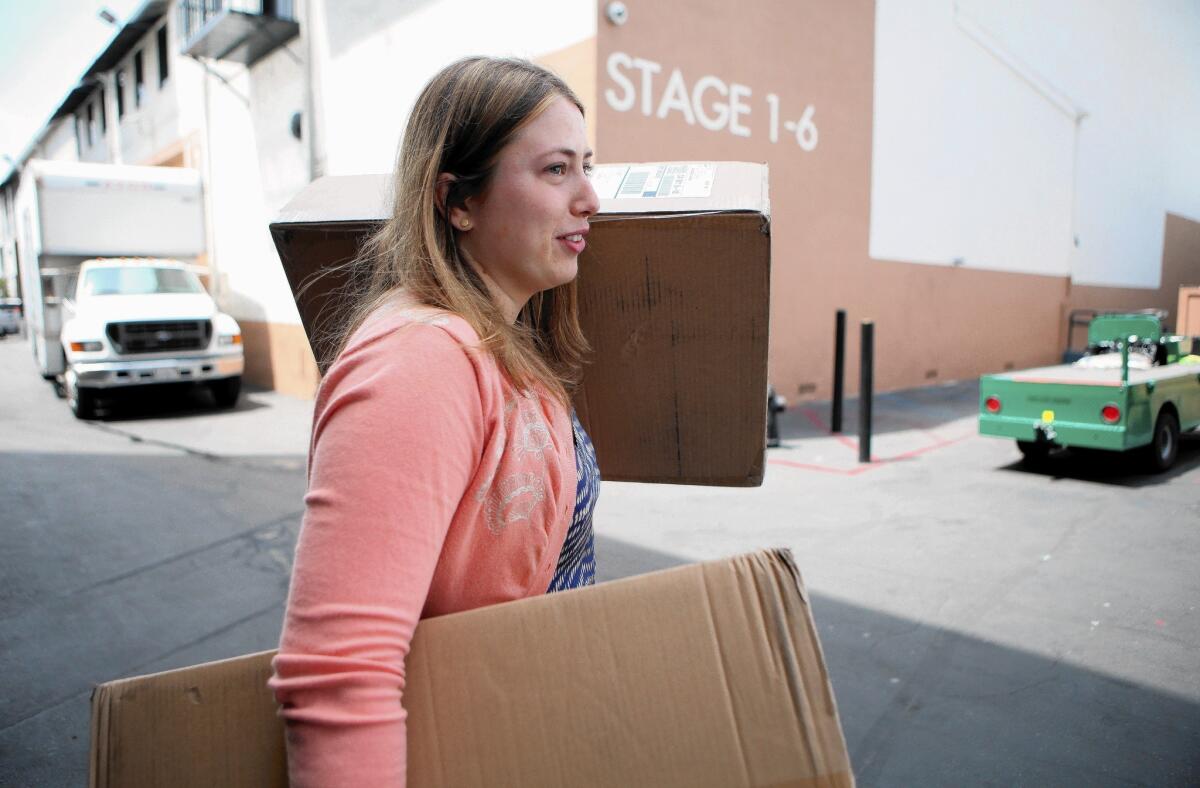Climbing the Hollywood ladder, one coffee or script delivery at a time

Just before midnight, as 25-year-old JP Erickson was getting ready to go to bed, his phone buzzed.
“Are you available tomorrow at 5:30 a.m.?”
The text was from the production coordinator of a low-budget movie offering a day’s work as an unpaid production assistant.
First thought: Unpaid and early — still worth going?
Then he looked up the address: A 45-minute drive from my apartment.
Not too far. Not close, either. But as a production assistant, commonly known as a PA, Erickson is used to late-night texts, early wake-up calls, low and occasionally no pay as well as the not-so-glamorous tasks of getting coffee and delivering scripts.
Still, PA gigs are resume builders and opportunities for aspiring filmmakers to network.
He set his alarm.
All right — five hours of sleep. Here we go.
Armed with “walkies” — used to listen to conversations between most people on set — production assistants do the necessary but oftentimes overlooked grunt work on TV and film sets.
“We’re kind of like the ghosts of the industry,” Erickson said.
Production assistants, a step up from film crew interns or extras, are responsible for providing support in almost all areas of production.
The hours are long (12-hour days are the norm), the wages are low (either an hourly minimum-wage rate or daily rate that can be as little as $100, depending on the project) or sometimes nonexistent, the tasks are trivial, and there’s little job security because many PAs are hired as “day pay” freelancers.
Like many, Erickson moved to Hollywood to pursue filmmaking, and he’s working as a PA in hopes of one day rising in the industry as many have done before him.
Consider that long before producer Kathleen Kennedy was nominated for eight Academy Awards and became president of George Lucas’ Lucasfilm, she was a production assistant for filmmaker John Milius, given the chore of cataloging his gun collection.
“I did have thoughts every now and then of, ‘Is this really what I want to do?’” Kennedy told the Hollywood Reporter. “But I knew I wanted to make movies, and I knew it was somewhat of a means to an end.”
On the set of the 1979 film “1941,” which Milius executive produced, director Steven Spielberg took notice of Kennedy’s work; she went on to become Spielberg’s producing partner on “E.T. the Extra-Terrestrial,” “Lincoln” and countless other films with her husband, Frank Marshall.
“Being a PA gives you the freedom to be a sponge and soak up knowledge from talented individuals around you,” said Erickson, who recently got hired as an assistant production office coordinator for a Food Network show.
But often, before the connections are made, there’s coffee shame. On one of Erickson’s first jobs, he heard over the walkie, “JP, I need you to bring coffee to Timothy.”
“Copy that,” he said. “Coffee to Timothy.”
Except a flustered Erickson forgot to ask one very important question: Who was Timothy?
Eventually, after going from department to department, he found out that Timothy was a cast member — but by then, the coffee was cold.
From emptying trash cans to driving miles around Los Angeles to deliver items to cast or crew members, production assistants say their lives are filled with odd and unpredictable tasks.
“The weirdest thing I’ve had to do as a PA is help shoot a low-budget movie at a studio where porn is usually shot,” said Liz, who wished to keep her last name anonymous to avoid deterring potential employers. “It was pretty gross. I definitely used gloves.”
“Once, I was so busy I only had like a 10-minute lunch break,” said Max Reid, who works as a PA and also as a barista on various film sets.
Despite its challenges, PAs interviewed for this story agreed that it’s an invaluable hands-on experience.
Amy Thurlow, a 26-year-old USC graduate, said working as a writer’s PA for the Lifetime TV series “Witches of East End” and the CW’s “Gossip Girl” has allowed her to interact with some of her industry heroes.
“The writers are incredibly warm, and getting their feedback on my work is amazing,” she said.
“One of the first things in school that they told us is that our film degree doesn’t really matter, our experiences do,” said Azusa Pacific University film student Kim Lowry, 22. “I want to write, and my mentor, a writer, was a PA and told me that’s the first step.”
And a job as a PA is far better than no job at all.
“One of my friends ate only ramen for months until she got her PA job,” Thurlow said. “It’s really tough out there, and sometimes PA-ing is the only way to make money and make connections.”
Including with each other.
Back in February, on a sunny Sunday afternoon in a Studio City strip mall, the dimly lighted Irish pub Maeve’s Residuals barely had standing room left.
The bar, once a popular Hollywood hangout, was the location for the first of many scheduled monthly meet-ups hosted by the Anonymous Production Assistant’s Blog, which seeks to portray a view of Hollywood “from the bottom.”
Aiming to rant, drink, brag and network, a group of at least 80 PAs, wearing name tags and sipping on cold beers, flocked to the pub after hearing about the meet-up online.
TAPA, as the anonymous blogger is known, created the website and meet-up “as a place to freely discuss the life of a production assistant without fear of repercussion or reprisal,” according to the blog.
“It’ll be a time to network. Meet future producers, directors, studio executives! Or, possibly future coordinators,” TAPA wrote in a blog post promoting the event.
Like a college mixer or speed-dating event, the more alcohol the attendees drank, the louder it got inside the bar. As they stood around in circles or mingled in booths, the attendees — mostly in their 20s or 30s and almost all Los Angeles transplants — left no subject untouched.
From spilling horror stories to trading networking tips, there was an obvious camaraderie among the group of strangers.
“I thought, ‘What is it that I can do in L.A. that’s not porn to make money?’” one attendee joked about why she chose to work as a PA.
“Someone once told me, ‘We’re all making film … even if we’re just making coffee,’” added another in the circle.
“No one wants to be a PA forever.”
But as 26-year-old production assistant Jamie Hanson noted: “At least we aren’t as low as the extras.”
More to Read
From the Oscars to the Emmys.
Get the Envelope newsletter for exclusive awards season coverage, behind-the-scenes stories from the Envelope podcast and columnist Glenn Whipp’s must-read analysis.
You may occasionally receive promotional content from the Los Angeles Times.









